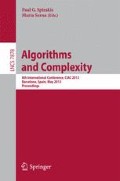Abstract
We consider capacitated rank-maximal matchings. Rank-maximal matchings have been considered before and are defined as follows. We are given a bipartite graph \( G= (\mathcal{A} \cup \mathcal{P}, {\cal E})\), in which \(\mathcal{A}\) denotes applicants, \(\mathcal{P}\) posts and edges have ranks – an edge (a,p) has rank i if p belongs to (one of) a’s ith choices. A matching M is called rank-maximal if the largest possible number of applicants is matched in M to their first choice posts and subject to this condition the largest number of appplicants is matched to their second choice posts and so on. We give a combinatorial algorithm for the capacitated version of the rank-maximal matching problem, in which each applicant or post v has capacity b(v). The algorithm runs in \(O(\min(B,C \sqrt{B} ) m)\) time, where C is the maximal rank of an edge in an optimal solution and \(B= \min (\sum_{a \in \mathcal{A}} {b(a)}, \sum_{p \in \mathcal{P}}{b(p)})\) and n, m denote the number of vertices/edges respectively. (B depends on the graph, however it never exceeds m.) The previously known algorithm [11] for this problem has a worse running time of O(Cnmlog(n 2/m) logn) and is not combinatorial –it is based on a weakly polynomial algorithm of Gabow and Tarjan using scaling. To construct the algorithm we use the generalized Gallai-Edmonds decomposition theorem, which we prove in a convenient form for our purposes. As a by-product we obtain a faster (by a factor of \(O(\sqrt{n})\)) algorithm for the Capacitated House Allocation with Ties problem.
Access this chapter
Tax calculation will be finalised at checkout
Purchases are for personal use only
Preview
Unable to display preview. Download preview PDF.
References
Abraham, D.J., Cechlárová, K., Manlove, D.F., Mehlhorn, K.: Pareto Optimality in House Allocation Problems. In: Fleischer, R., Trippen, G. (eds.) ISAAC 2004. LNCS, vol. 3341, pp. 3–15. Springer, Heidelberg (2004)
Abraham, D.J., Chen, N., Kumar, V., Mirrokni, V.S.: Assignment Problems in Rental Markets. In: Spirakis, P.G., Mavronicolas, M., Kontogiannis, S.C. (eds.) WINE 2006. LNCS, vol. 4286, pp. 198–213. Springer, Heidelberg (2006)
Abraham, D.J., Irving, R.W., Kavitha, T., Mehlhorn, K.: Popular Matchings. SIAM J. Comput. 37(4), 1030–1045 (2007)
Huang, C.-C., Kavitha, T., Michail, D., Nasre, M.: Bounded Unpopularity Matchings. Algorithmica 61(3), 738–757 (2011)
Gabow, H.N.: An Efficient Reduction Technique for Degree-Constrained Subgraph and Bidirected Network Flow Problems STOC, pp. 448–456 (1983)
Irving, R.W.: Greedy matchings. Technical report TR-2003-136, University of Glasgow (April 2003)
Irving, R.W., Kavitha, T., Mehlhorn, K., Michail, D., Paluch, K.E.: Rank-maximal matchings. ACM Transactions on Algorithms 2(4), 602–610 (2006)
Lovasz, L., Plummer, M.D.: Matching Theory. Ann. Discrete Math., vol. 29. North-Holland, Amsterdam (1986)
Mahdian, M.: Random popular matchings. In: ACM Conference on Electronic Commerce, pp. 238–242 (2006)
Manlove, D.F., Sng, C.T.S.: Popular Matchings in the Capacitated House Allocation Problem. In: Azar, Y., Erlebach, T. (eds.) ESA 2006. LNCS, vol. 4168, pp. 492–503. Springer, Heidelberg (2006)
Mehlhorn, K., Michail, D.: Network Problems with Non-Polynomial Weights and Applications (2005) (manuscript)
Michail, D.: Reducing rank-maximal to maximum weight matching. Theor. Comput. Sci. 389(1-2), 125–132 (2007)
Mestre, J.: Weighted Popular Matchings. In: Bugliesi, M., Preneel, B., Sassone, V., Wegener, I. (eds.) ICALP 2006. LNCS, vol. 4051, pp. 715–726. Springer, Heidelberg (2006)
Roth, A.E., Postlewaite, A.: Weak versus strong domination in a market with indivisible goods. J. Math. Econom. 4, 536–546 (1977)
Author information
Authors and Affiliations
Editor information
Editors and Affiliations
Rights and permissions
Copyright information
© 2013 Springer-Verlag Berlin Heidelberg
About this paper
Cite this paper
Paluch, K. (2013). Capacitated Rank-Maximal Matchings. In: Spirakis, P.G., Serna, M. (eds) Algorithms and Complexity. CIAC 2013. Lecture Notes in Computer Science, vol 7878. Springer, Berlin, Heidelberg. https://doi.org/10.1007/978-3-642-38233-8_27
Download citation
DOI: https://doi.org/10.1007/978-3-642-38233-8_27
Publisher Name: Springer, Berlin, Heidelberg
Print ISBN: 978-3-642-38232-1
Online ISBN: 978-3-642-38233-8
eBook Packages: Computer ScienceComputer Science (R0)

